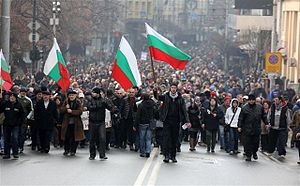| 2013 Bulgarian protests against the first Borisov cabinet Протести срещу кабинета "Борисов" | |||
|---|---|---|---|
 Protest in Sofia, 17 February 2013 | |||
| Date | 28 January 2013 – 16 March 2013 | ||
| Location | |||
| Caused by | |||
| Methods | |||
| Resulted in | Resignation of the cabinet; Raykov government takes power; early Parliamentary elections; reductions in energy prices; increase in pensions; government support (41 million leva) for the poorest segments of the population[8][9][10] | ||
| Number | |||
| |||
| Casualties | |||
| Death(s) | 5[12][13] | ||
| Injuries | 24[14] | ||
| Arrested | dozens (according to unofficial estimates), 60+ (based on police sources)[8][15][16][17][18][19] | ||
The 2013 Bulgarian protests against the first Borisov cabinet were civil demonstrations against high electricity and hot water bills resulting from monopolism in the sphere that began in Blagoevgrad on 28 January 2013, and subsequently spread to over 30 cities in Bulgaria that ended with the resignation of the Boyko Borisov government on 20 February 2013. They were caused by abnormally high electricity bills, but later turned into a mass non-partisan movement against the government and the political system. The events were marked by seven self-immolations (five of them fatal), spontaneous demonstrations and a strong sentiment against political parties.
As a result of the demonstrations, the centre-right government of Boyko Borisov resigned and a caretaker cabinet led by Marin Raykov was appointed. The demands of protesters, however, were not addressed, and demonstrations continued throughout the country, calling for a change of the political model and nationalisation of strategic economic sectors.
- ^ "Организаторката на протест срещу високите сметки за ток - в ареста". bTV (Bulgaria). 5 February 2013. Retrieved 21 February 2013.
- ^ "ITUC Frontlines Report 2012: Section on Bulgaria". Novinite. 10 October 2012. Retrieved 10 October 2012.
- ^ "Bulgaria's political crisis and the next election: Who will win?". The Sofia Globe. 21 February 2013. Retrieved 21 February 2013.
- ^ "Световните медии за оставката на Борисов". Darik News. 20 February 2013. Retrieved 23 February 2013.
- ^ "Международната преса преди изборите в България: корупция, обезверение, патова ситуация" (in Bulgarian). mediapool.bg. 10 May 2013. Retrieved 12 July 2014.
- ^ "Protests in Bulgaria and the new practice of democracy". Al-Jazeera English. 21 February 2013. Retrieved 7 March 2013.
- ^ Stanchev, Krasen (22 March 2013). "Протести и икономическо знание". ime.bg. Retrieved 12 May 2014.
- ^ a b "Протестите срещу монополите". dnes.dir.bg. Archived from the original on 31 December 2013. Retrieved 7 April 2014.
- ^ "Министерството на отбраната не дава пари от бюджета си за най-бедните". glasove.com. 30 March 2013. Retrieved 14 April 2014.
- ^ "Правителството отпуска 41 млн. лв. за помощи на най-бедните, НСТС прие пакета от спешни социални мерки за най-нуждаещите се". blitz.bg. 8 April 2013. Retrieved 14 April 2014.
- ^ Cite error: The named reference
segawas invoked but never defined (see the help page). - ^ "Bulgaria holds prayers to end suicides and despair". BBC News. 5 April 2013. Retrieved 10 May 2013.
- ^ Tsolova, Tsvetelia. "Bulgaria's protesters demand stop of state railway sale". Reuters. Retrieved 12 March 2013.
- ^ "Окървавиха протеста в София" (in Bulgarian). monitor.bg. 20 February 2013. Archived from the original on 28 June 2013. Retrieved 26 February 2014.
- ^ "Протестът за тока прерасна в бунт срещу правителството, хиляди блокираха улици и пътища в София и в десетки градове, стигна се до отделни сблъсъци с полицията". Mediapool. 17 February 2013. Retrieved 27 March 2014.
- ^ "11 души са задържани на протеста в София, протестите продължават и днес". Tema Daily. 19 February 2013. Retrieved 27 March 2014.
- ^ "30 арестувани след края на протеста в София". Pernik News. 25 February 2013. Retrieved 27 March 2014.
- ^ "13 арестувани след вчерашните протести". profit.bg. 26 February 2013. Retrieved 27 March 2014.
- ^ "Протестите продължават, 25 души са арестувани от полицията в столицата". ekipnews.com. 27 February 2013. Archived from the original on 27 March 2014. Retrieved 27 March 2014.